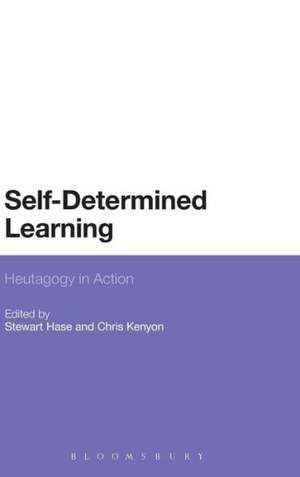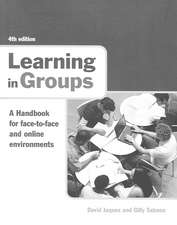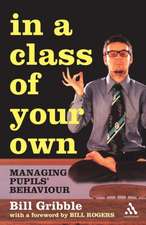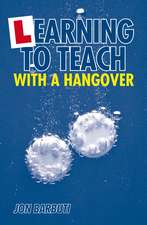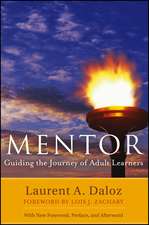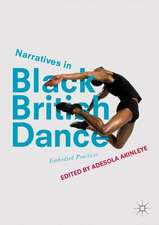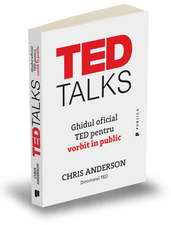Self-Determined Learning: Heutagogy in Action
Editat de Dr Stewart Hase, Chris Kenyonen Limba Engleză Hardback – 25 sep 2013
| Toate formatele și edițiile | Preț | Express |
|---|---|---|
| Paperback (1) | 256.59 lei 6-8 săpt. | |
| Bloomsbury Publishing – 25 mar 2015 | 256.59 lei 6-8 săpt. | |
| Hardback (1) | 889.88 lei 6-8 săpt. | |
| Bloomsbury Publishing – 25 sep 2013 | 889.88 lei 6-8 săpt. |
Preț: 889.88 lei
Preț vechi: 1140.72 lei
-22% Nou
Puncte Express: 1335
Preț estimativ în valută:
170.30€ • 177.14$ • 140.59£
170.30€ • 177.14$ • 140.59£
Carte tipărită la comandă
Livrare economică 14-28 aprilie
Preluare comenzi: 021 569.72.76
Specificații
ISBN-13: 9781441142771
ISBN-10: 1441142770
Pagini: 224
Dimensiuni: 156 x 234 x 18 mm
Greutate: 0.48 kg
Ediția:New.
Editura: Bloomsbury Publishing
Colecția Bloomsbury Academic
Locul publicării:London, United Kingdom
ISBN-10: 1441142770
Pagini: 224
Dimensiuni: 156 x 234 x 18 mm
Greutate: 0.48 kg
Ediția:New.
Editura: Bloomsbury Publishing
Colecția Bloomsbury Academic
Locul publicării:London, United Kingdom
Caracteristici
Draws together contributors from different fields to explore the approach in a range of contexts
Notă biografică
Stewart Hase is a consulting psychologist and writer. He is also an adjunct fellow at Southern Cross University, Australia, and consults for a number of public and private organizations.Chris Kenyon is an adviser and consultant. He has worked around the world assisting government agencies and commercial organizations.
Cuprins
Introduction, Chris Kenyon (consultant, Australia) and Stewart Hase (consulting psychologist, Australia)Part I: The Fundamentals of Heutagogy1. Heutagogy Fundamentals, Stewart Hase (consulting psychologist, Australia) and Chris Kenyon (consultant, Australia)2.The Nature of Learning, Stewart Hase (consulting Psychologist, Australia) and Chris Kenyon (consultant, Australia)Part II: Applying Heutagogy in Formal Education3. Crafting Learner-Centred Processes using Action Research and Action Learning, Bob Dick (independent scholar, Australia)4. e-Learning and Self-Determined Learning Skills, Lisa Marie Blaschke(Carl von Ossietzky University of Oldenburg, Germany)5. Applying the Principles of Heutagogy to a Postgraduate Distance-Learning Programme, Trevor Kerry (Bishop Grosseteste University College, UK)6. Workplace Learning for Nurses, John Hurley (Southern Cross University, Australia), Mike Ramsay (University of Dundee, UK) and Gavin Neilson (University of Dundee, UK)7. The Learners' Perspective, Barbara Brandt (University of Minnesota Duluth, USA)Part III: Heutagogy in the Wider Education World8. Developing Creativity, Fred Garnett (University of London, UK) 9. Putting Heutagogy into Learning, Fred Garnett (University of London, UK) and Ronan O'Beirne (Bradford College, UK)10. Lifelong Learning, Jane Eberle (Emporia State University, USA)11. Learner Defined Learning, Stewart Hase (Consulting Psychologist, Australia)12. Practitioner Development in Early Years Education, Natalie Canning (Open University, UK)13. Transitioning from Pedagogy to Heutagogy, Tay Boon Hou (In Technology, Singapore)14. Innovations in Community Education, Ros Foskey (University of New England, Australia)Part IV: Summary15. Where to Next?, Stewart Hase (consulting psychologist, Australia) and Chris Kenyon (consultant, Australia)Index
Recenzii
This text is a really useful addition to the extensive literature on learner-centred learning. It challenges the academic community to take seriously alternative approaches to education that have long been promoted and shown to work. The problems in academia seem to reflect what the book explores, namely a narrow and discredited model of learning. The lack of attention to tried and tested alternatives shames the academic establishment.
